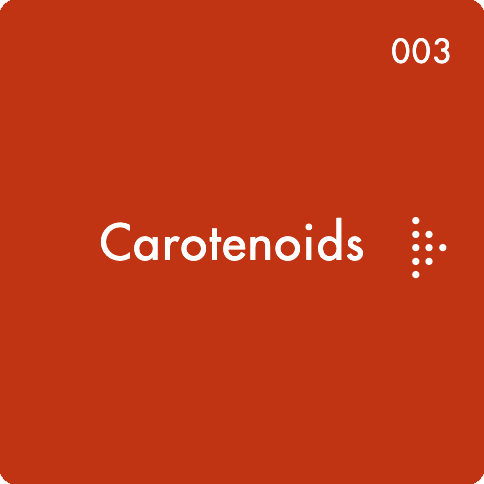
Health Functions
Carotenoids help the human body protect itself from disorders such as cancer, heart disease and eye diseases. Read More

Carotenoids are naturally occurring fat-soluble pigments that are synthesized by plants, algae and photosynthetic bacteria. Carotenoids are the sources of the yellow, orange, and red colors in many plants, e.g., the orange-red colors of oranges, tomatoes and carrots and the yellow colors of many flowers.
Carotenoids can be broadly classified into two classes:
Some carotenoids such as beta-carotene can be converted to vitamin A and are referred to as provitamin A carotenoids. As carotenoids cannot be synthesized by humans they must be obtained from vegetables in the diet.
Additional sources for carotenoids are dietary supplements. They are also used to fortify or color many manufactured foods and drinks either in the form of natural extracts or as pure compounds manufactured by chemical synthesis.
Carotenoids are important factors in human health and essential for vision. The role of some carotenoids (e.g. beta-carotene) as the main dietary source of vitamin A is well studied. In addition, potential protective effects of carotenoids against degenerative eye diseases and other deficiency-related disorders have been recognized. Thus, a sufficient intake of carotenoids is crucial for preventing the development of deficiency-related diseases. Moreover, some carotenoids have considerable potential for health promotion and disease treatment.
The contradictory results of some studies show the complexity of the relationship between health and nutrition. The methods for measuring effects are fairly limited and in some cases are considered insufficient (see also Principles – The contradictory science of micronutrients).
Carotenoids are essential to life and healthy living.
A clinical trial found that people with age-related macular degeneration were able to slow its progression by supplementing with beta-carotene, vitamin C, vitamin E, zinc, and copper. Further studies need to confirm this beneficial effect. Read More
Both European and U.S. health authorities have decided that the existing evidence is insufficient to establish intake recommendations for carotenoids. Read More
Scientific and government organizations in Europe and the U.S recommend consumption of foods rich in beta-carotene. The average amount that people currently consume in the U.S. and several European countries is lower than these intake recommendations. To date, there is only very limited data on the consumption of lycopene, lutein, and zeaxanthin. Read More
A low dietary intake of carotenoids has not been directly associated with disease. Read More